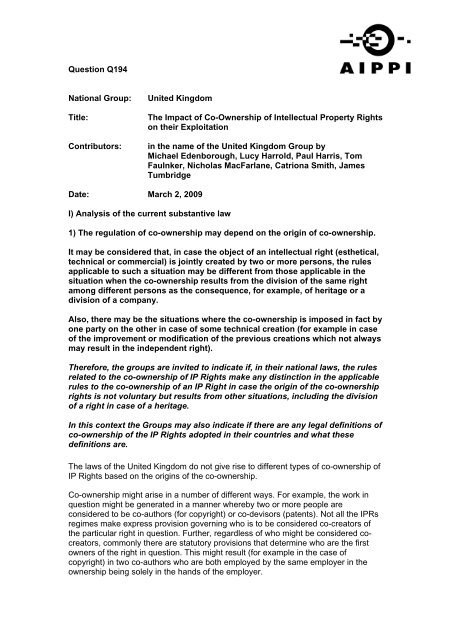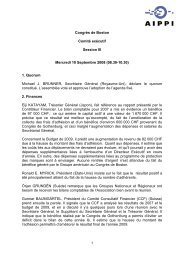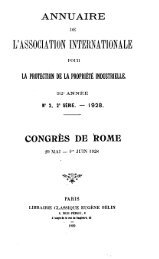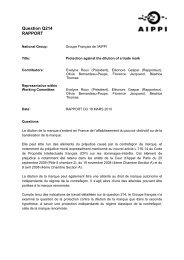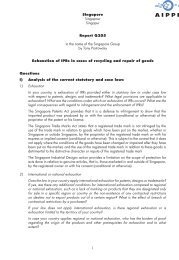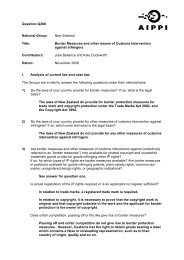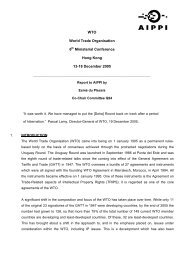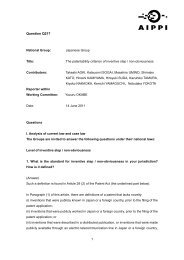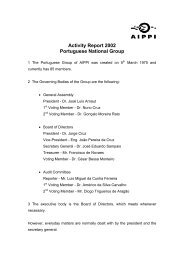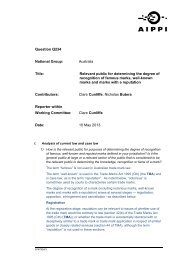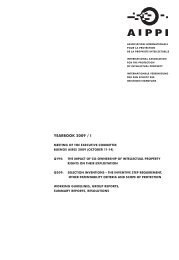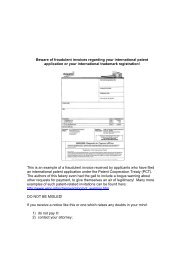Question Q194 National Group: United Kingdom Title: The ... - AIPPI
Question Q194 National Group: United Kingdom Title: The ... - AIPPI
Question Q194 National Group: United Kingdom Title: The ... - AIPPI
Create successful ePaper yourself
Turn your PDF publications into a flip-book with our unique Google optimized e-Paper software.
<strong>Question</strong> <strong>Q194</strong><br />
<strong>National</strong> <strong>Group</strong>:<br />
<strong>Title</strong>:<br />
Contributors:<br />
<strong>United</strong> <strong>Kingdom</strong><br />
<strong>The</strong> Impact of Co-Ownership of Intellectual Property Rights<br />
on their Exploitation<br />
in the name of the <strong>United</strong> <strong>Kingdom</strong> <strong>Group</strong> by<br />
Michael Edenborough, Lucy Harrold, Paul Harris, Tom<br />
Faulnker, Nicholas MacFarlane, Catriona Smith, James<br />
Tumbridge<br />
Date: March 2, 2009<br />
I) Analysis of the current substantive law<br />
1) <strong>The</strong> regulation of co-ownership may depend on the origin of co-ownership.<br />
It may be considered that, in case the object of an intellectual right (esthetical,<br />
technical or commercial) is jointly created by two or more persons, the rules<br />
applicable to such a situation may be different from those applicable in the<br />
situation when the co-ownership results from the division of the same right<br />
among different persons as the consequence, for example, of heritage or a<br />
division of a company.<br />
Also, there may be the situations where the co-ownership is imposed in fact by<br />
one party on the other in case of some technical creation (for example in case<br />
of the improvement or modification of the previous creations which not always<br />
may result in the independent right).<br />
<strong>The</strong>refore, the groups are invited to indicate if, in their national laws, the rules<br />
related to the co-ownership of IP Rights make any distinction in the applicable<br />
rules to the co-ownership of an IP Right in case the origin of the co-ownership<br />
rights is not voluntary but results from other situations, including the division<br />
of a right in case of a heritage.<br />
In this context the <strong>Group</strong>s may also indicate if there are any legal definitions of<br />
co-ownership of the IP Rights adopted in their countries and what these<br />
definitions are.<br />
<strong>The</strong> laws of the <strong>United</strong> <strong>Kingdom</strong> do not give rise to different types of co-ownership of<br />
IP Rights based on the origins of the co-ownership.<br />
Co-ownership might arise in a number of different ways. For example, the work in<br />
question might be generated in a manner whereby two or more people are<br />
considered to be co-authors (for copyright) or co-devisors (patents). Not all the IPRs<br />
regimes make express provision governing who is to be considered co-creators of<br />
the particular right in question. Further, regardless of who might be considered cocreators,<br />
commonly there are statutory provisions that determine who are the first<br />
owners of the right in question. This might result (for example in the case of<br />
copyright) in two co-authors who are both employed by the same employer in the<br />
ownership being solely in the hands of the employer.
<strong>The</strong> law does distinguish between all forms of co-ownership as being either<br />
ownership as a ‘tenant in common’ or as a ‘joint tenant.’ <strong>The</strong> principal difference<br />
between these two forms concerns the rules relating to survivorship. Under joint<br />
tenancy, if one co-owner were to die, then his share automatically would be<br />
distributed amongst the remainder co-owners; while in contrast under tenancy in<br />
common, if one co-owner dies, then his share devolves in accordance with his<br />
testimonial wishes, or if there is no will, then in accordance with the rules of intestacy.<br />
Typically, IPRs jointly owned in a commercial context would be held as a tenancy in<br />
common, but occasionally this might not occur, e.g. husband and wife scenarios, and<br />
maybe for certain types of confidential information (e.g. personal as opposed to<br />
technical).<br />
<strong>The</strong> UK law also permits for the legal and equitable titles to a right to be owned by<br />
different people. For example, if there is a binding agreement to assign a right, but<br />
that agreement has not yet been executed, or the execution was flawed so that there<br />
was a failure to transfer the right in question, this could lead to co-ownership of the<br />
legal and equitable rights being held by different persons until the title is untied back<br />
in one person.<br />
We do not propose to take consideration of the position of partnerships that own an<br />
IPR as a partnership asset. Such assets being subject to rules of partnership deeds<br />
and the rules in the Partnership Act 1890; in particular, the operation of section 5,<br />
whereby permission granted by one partner binds his fellow partners.<br />
<strong>The</strong>re is no strict legal definition of co-ownership governing IPR. <strong>The</strong> concepts<br />
applicable arise from UK property law generally. Under UK law, all intellectual<br />
property rights (IPRs) have their own framework either under statute or common law.<br />
<strong>The</strong> principal IPRs available in the UK are:<br />
Registered Rights:<br />
Patents (UK and EP designating the UK)<br />
Registered Designs (UK and Community)<br />
Registered Trade Marks (UK and Community)<br />
Equitable right – unregistered:<br />
Confidential Information (excluding official secrets, which are governed by the Official<br />
Secrets Act 1989)<br />
Unregistered Rights:<br />
Unregistered Designs (UK and Community)<br />
Passing Off<br />
Copyright<br />
Co-owners may regulate their ownership by contract. As a general rule, contract<br />
overrides the statutory provisions, save for the obvious exceptions like illegality. For<br />
an overview of these IPRs and the rights and definitions of co-owners we would refer<br />
the reader to the answer provided by the UK to question 194 at the Singapore ExCo<br />
2007.<br />
2) A large debate, during the Singapore EXCO, took place with regard to the<br />
notion of the exploitation of an IP right.
More specifically, the groups were highly divided on the issue of outsourcing<br />
or subcontracting the exploitation of an IP right.<br />
This question, particularly important in case of patents, relates particularly to<br />
the problem of subcontracting when a co-owner of the patent who, in principle,<br />
and at least according to the position expressed by <strong>AIPPI</strong> in its 2007 Singapore<br />
Resolution, has the personal right to exploit his own part of the patent,<br />
specifically by manufacturing and selling the goods or processes covered by<br />
the patent, needs to subcontract partially or totally the manufacturing of the<br />
product covered by the patent.<br />
No common position could be achieved by the Singapore EXCO in 2007 on the<br />
question if the right to exploit the patent should also cover the right to<br />
subcontract, specifically the manufacturing of all or part of the invention being<br />
the subject matter of the patent.<br />
<strong>The</strong>refore, the groups are invited to present the solutions of their national laws<br />
on this specific point.<br />
We would refer the reader to the answer provided by the UK to question 194 at the<br />
Singapore ExCo 2007 for the position in the UK on the rights of co-owners to exploit,<br />
and the ability to licence their rights. Under the UK law outsourcing or<br />
subcontracting would be done by operation of a licence.<br />
As this question raises specific concern as to patents we respond in detail on the<br />
position regarding patents in the UK:<br />
Patents are governed by the Patents Act 1977. Other than by agreement to the<br />
contrary, those who are jointly granted a patent, are each entitled to an equal<br />
undivided share in the patent (section 36(1)) and to work the invention for their own<br />
benefit without accounting to the others (section 36(2)). <strong>The</strong>refore co-owners are free<br />
to agree amongst themselves how to work their patent, and only fall back on the<br />
Patents Act when there is no agreement.<br />
Pursuant to section 36(2)(a) & (b) of Patents Act 1977; where two or more persons<br />
are proprietors of a patent, then, subject to the Act and any agreement to the<br />
contrary each of them shall be entitled, by himself or his agents, to do in respect of<br />
the invention concerned, for his own benefit and without the consent of or the need<br />
to account to the other or others, any act which would apart from this subsection …,<br />
amount to an infringement of the patent concerned.<br />
At common law one co-owner cannot prevent any other co-owner from working the<br />
invention, see Steers v Rogers [1893] AC 232. However, at common law, one coowner<br />
acting alone could not give a licence binding the other co-owner(s), although<br />
there appears to be no authority directly on the point.<br />
A co-owner of a patent may not grant a licence under the patent without the consent<br />
of the other owners (section 36(3)) Henry Bros (Magherafelt) Ltd. v. Ministry of<br />
Defence [1997] RPC 693. Another person may supply a co-owner of a patent with an<br />
essential element for the working of the invention, and such supply will not amount to<br />
an infringement of the patent (section 36(4)). If a co-owner disposes of a patented<br />
product to any person, then that person (and any other person claiming through him)<br />
is entitled to deal with the product in the same way as if it had been disposed of by a<br />
sole registered proprietor (section 36(5)). <strong>The</strong> UK group also wished to draw<br />
attention to the fact that our law differs from the USA in these matters.<br />
<strong>The</strong>refore a sub-contractor, when acting as agent to a co-owner of a patent<br />
exploiting their IPR is acceptable, save where a licence is necessary for the use of<br />
said sub-contractor. Likewise in out-sourcing, if no licence is required it is<br />
acceptable in principle, but the UK believes such arrangements will typically require<br />
a licence. Should a licence be required, and it be refused by one co-owner as<br />
against another which frustrates the ability to work the invention, then an application<br />
to the Comptroller of Patents can be made to resolve the dispute between the co-
owners; the Comptroller having the power to make orders as between co-owners<br />
(section 37). <strong>The</strong>re have been cases where the Comptroller of Patents has given a<br />
co-owner the power to grant licences without referring to the other co-owners. See<br />
for example, McGriskin's Patent (BL 0/36/99 and 0/135/00) where it was ordered that<br />
a newly determined co-owner (under Patent Act s.37 proceedings) should be<br />
permitted to grant licences without agreement or interference from the other coowner,<br />
overriding section 36. See also Andrew's Application (BL 0/21/98). Further,<br />
the Court of Appeal in Hughes v Paxman [2006] EWCA Civ 818, confirmed that<br />
under the Patent Act 1977 section 37, the Comptroller does have jurisdiction to grant<br />
licences to a party approved of by only one co-owner. However, the broad discretion<br />
exercised by the Comptroller of Patents is not available in all IPRs.<br />
Note that the situation for other IPRs is often fundamentally different. <strong>The</strong>refore, for<br />
example, for copyright, one co-owner has no right to exercise the rights alone, not<br />
even if he accounts to his co-owners for an appropriate share of the profits<br />
(Cescinsky v George Routlege & Sons Ltd [1916] 2 KB 325).<br />
3) <strong>The</strong> working guidelines established for the Singapore EXCO contained also<br />
the question related to the possibility of the co-owner of an IP right to licence<br />
this right to third parties.<br />
No distinction was, however, made in this context between a non-exclusive<br />
and an exclusive licence.<br />
No differentiation was also made on the number of licences which could be<br />
given by one co-owner in case the non-exclusive licence would be permitted<br />
by the national law.<br />
And if the <strong>AIPPI</strong> adopted a resolution on the conditions of granting the licence,<br />
it also appeared during the discussion at the EXCO that some different or more<br />
precise solutions could have been obtained if the Working Committee had<br />
made a distinction between the nature of the licence.<br />
<strong>The</strong>refore, in order to improve the work of the EXCO, the groups are invited to<br />
specify how the differences in the nature of licenses (non-exclusive or<br />
exclusive) influence the solution of their national laws in respect of the right to<br />
grant the licence by a co-owner of an IP Right.<br />
<strong>The</strong> law of the UK in general draws no distinction between exclusive and nonexclusive<br />
licences, in regard to the question posed. If a licence is permitted it may be<br />
either exclusive or non-exclusive. We would refer the reader to the answer provided<br />
by the UK to question 194 at the Singapore ExCo 2007 for the position in the UK as<br />
to the right of co-owners to grant licences.<br />
Some of the UK’s legislation draws specific attention to the ability to have both<br />
exclusive and non-exclusive licences, for example the Trade Mark Act 1994 in<br />
sections 28 – 31, which recognises a difference between exclusive and nonexclusive<br />
licences; in that, subject to the licence terms, the exclusive licence provides<br />
the same rights to the licensee as if the trade mark had been assigned. Further, the<br />
UK’s copyright legislation in the Copyright Designs and Patents Act 1998 makes<br />
certain infringements actionable by a non-exclusive licensee, and like the trade mark<br />
legislation recognises that exclusive licensees may bring actions for infringement<br />
without the owner.
4) One of the most difficult questions which appeared during the discussion at<br />
the Singapore EXCO was the possibility to transfer or assign a co-owned share<br />
of an IP right.<br />
And the problem seemed so complicated that finally the Working Committee<br />
decided to withdraw its proposal for a resolution on this point.<br />
In fact, the discussion showed that the solutions concerning the right to<br />
transfer or assign may vary since there is a huge variety of situations related to<br />
the transfers of the co-owned share.<br />
Notably, one could imagine that the transfer is operated on the whole share of<br />
the co-owned IP right, but it also could be simply an assignment of a part of<br />
the co-owned share, creating therefore an additional co-owner of an IP right.<br />
And such transfer of a part of a share of an IP Right could be used to overcome<br />
the limitation which could exist on the granting of licences by the co-owners.<br />
<strong>The</strong> <strong>Group</strong>s are therefore invited to precise their position on the question of<br />
the transfer or assignment of a share of the co-owned IP Right, taking into the<br />
consideration the different situations which may occur ( the transfer of the<br />
whole share of a co-owned IP Right or the transfer only of the part of the share<br />
of the co-owned IP Right).<br />
In the UK any assignment as described in the foregoing question is permissible by<br />
contract. <strong>The</strong> English law permits parties to contract for anything that is not<br />
prohibited by statute, commonly known as freedom of contract. If there were a<br />
dispute between owners as to the ability to assign only a sub-share of the share<br />
presently owned by the co-owner, this could be referred to the Court or in the case of<br />
patents the Comptroller for a determination under their power set down in section 37<br />
of the Patents Act referred to above in sub-question 2.<br />
5) <strong>The</strong> exercise of an IP right co-owned by two or more co-owners each of<br />
whom has in principle the right to exploit the co-owned right, may also raise<br />
difficulties from the point of view of competition rules.<br />
<strong>The</strong> co-owned IP Rights may give the co-owners the dominant position on the<br />
market and their agreement on the co-owned IP Rights (when for example it<br />
prohibits the licensing) may also be seen as eliminating the competitors from<br />
the market.<br />
<strong>The</strong> groups are therefore invited to explain if their national laws had to treat<br />
such situations and what were the solutions adopted in those cases.<br />
<strong>The</strong> UK like elsewhere seeks to achieve a balance between the public interest in the<br />
limited monopolies of IPRs, and the public interest in competition. <strong>The</strong> response to<br />
this sub-question considers three areas of law; (1) European Union law on<br />
Competition, (2) UK law on Competition, and (3) Compulsory licences in patents.<br />
(1) European Union Law<br />
IPRs are monopolies and restrict competition; as a result agreements which affect<br />
the ownership and control of IPRs and the manner of their exploitation can breach<br />
competition law in certain circumstances. In relation to European Union law the<br />
affect upon competition by IPRs between member states is the paramount concern.
Article 81(1) of the EC Treaty prohibits, ‘as incompatible with the common market,’<br />
agreements ‘that may affect trade between member states and have the object or<br />
effect of preventing, restricting or distorting competition within the common market.’<br />
However, agreements falling within Article 81(1) may be exempted under Article<br />
81(3) or, if they fall within the defined parameters of a block exemption for the<br />
particular type of agreement, they may be automatically exempted. <strong>The</strong>re are block<br />
exemptions for licences of patents and/or know-how (the Technology Transfer block<br />
exemption (Commission Regulation (EC) No 772/2004 (OJ 2004 L123/11) which<br />
replaced Commission Regulation (EC) No 240/96 as of 1 May 2004), for agreements<br />
concerning research and development or specialisation and for vertical agreements).<br />
Joint ventures that are ‘concentrative’ will in general avoid sanction (Commission<br />
control) unless they are large enough to fall within the scope of Council Regulation<br />
(EC) No 139/2004 on the control of concentrations between undertakings (ECMR),<br />
which provides a largely self contained mechanism of control. Other joint ventures,<br />
termed ‘co-operative’ fall to be considered under Article 81 and any applicable block<br />
exemptions. <strong>The</strong> Commission has issued a Notice concerning the assessment of<br />
horizontal co-operation agreements under Article 81 (the Guidelines) (OJ 2001<br />
C3/02).<br />
Competition issues can arise in collaborative R&D agreements which result in IPRs<br />
being co-owned. <strong>The</strong> Commission's being concerned that collaborators (whether<br />
they are actual or potential competitors) reduce competition. Such agreements, if<br />
between large enough companies who are potential competitors, will in practice<br />
almost inevitably contain restrictions which might on their face breach Article 81,<br />
irrespective of whether or not the collaboration is undertaken by means of a separate<br />
joint venture vehicle.<br />
<strong>The</strong> Commission accepts it is in the public interest to encourage co-operation in R&D<br />
and in the exploitation of the results thereby generated, which requires a balanced<br />
approach to the restrictions of Article 81. <strong>The</strong> Research and Development Block<br />
Exemption (the R&DE) (Commission Regulation (EC) No 2659/2000 on the<br />
application of Article 81(3) of the EC Treaty to categories of research and<br />
development (OJ 2000 L304/7)), reflects this approach. <strong>The</strong> R&DE exempting from<br />
Article 81 certain agreements for joint R&D and joint exploitation (including<br />
assignments or licensing of intellectual property rights or the communication of knowhow<br />
to third parties) of the results of that R&D. However, the R&DE applies only<br />
where the agreement meets certain criteria such as:<br />
• All parties have access to the results of the joint R&D for the purposes of<br />
further research or exploitation (Article 3(2), R&DE).<br />
• Where the parties are not competing undertakings at the time the agreement<br />
is entered into, the right to exploit the results may be limited to one or more<br />
technical fields of application (Article 3(3)).<br />
• <strong>The</strong> joint exploitation relates to results which are protected by intellectual<br />
property rights, or constitute know-how, which substantially contribute to<br />
technical or economic progress, and the results are decisive for (that is,<br />
central to) the manufacture of the contract products or the application of the<br />
contract processes (Article 3(4)).
• Undertakings charged with manufacture by way of specialisation in production<br />
must fulfil orders for supplies from all the parties, except where the R&D<br />
agreement also provides for joint distribution (Article 3(5)).<br />
• Where the parties are not competing undertakings, the R&DE will apply for<br />
the duration of the R&D programme and for seven years afterwards if the<br />
results are to be jointly exploited. If the parties are competing undertakings,<br />
that same period will apply only if the parties' combined market share does<br />
not exceed 25% of the market for products capable of being improved or<br />
replaced by the contract products. In either case, after the seven-year<br />
exploitation period, the exemption may continue to apply indefinitely provided<br />
the parties' continued production of the contract products and other<br />
substitutable products does not exceed 25% of the total market for such<br />
products.<br />
All conditions under which undertakings pursue R&D are permitted, subject to certain<br />
conditions and to the exclusion of certain hardcore restrictions, such as:<br />
• A prohibition on challenges to the validity of intellectual property rights which<br />
the parties hold in the EU and which are relevant to or protect the results of<br />
the R&D (but provisions which allow a party to terminate the R&D agreement<br />
if its intellectual property rights are challenged by the other are allowed).<br />
• A prohibition on the putting of the contract products on the market, or the<br />
pursuit of an active sales policy for them, in territories within the EU that are<br />
reserved for other parties after the end of seven years from the time the<br />
contract products are first put on the market in the EU.<br />
• A requirement to refuse to meet demand from users or resellers in their<br />
respective territories who would market the contract products in other<br />
territories within the EU.<br />
Certain restrictions are specifically permitted:<br />
• Setting production targets where the exploitation of the results includes the<br />
joint production of the contract product.<br />
• Setting sales targets and fixing prices to be charged to immediate customers<br />
where the exploitation of the results includes the joint distribution of the<br />
contract products. (Article 5(2), R&DE.)<br />
(2) UK Law<br />
UK competition law mirrors EU law to a great extent, the Chapter I prohibition under<br />
the Competition Act 1998 which mirrors Article 81 is similarly subject to various<br />
exemptions. Although the substantive legal principles relevant to the application of<br />
the Chapter I Competition Act prohibition to agreements and the Chapter II<br />
Competition Act prohibition to conduct are similar or identical to those under Articles<br />
81 and 82 of the EC Treaty respectively, the licensing of IP rights may be different in<br />
some respects.<br />
(3) Compulsory licences in patents<br />
One method by which the UK deals with anti-competitive practices is that of<br />
compulsory licences, per s.48 Patents Act 1977. <strong>The</strong>refore in the scenario that
patent holders choose not to work an invention to suppress its use, or are failing to<br />
meet market demand third parties can apply for compulsory licences to work the<br />
invention. Such applications may also be applied for where one co-owner is<br />
preventing the other from working the invention due to their need to licence a third<br />
party, in accordance with the case of Hughes v Paxman [2006] EWCA Civ 818.<br />
Compulsory licences cannot be granted until after three years from grant of the<br />
patent<br />
6) <strong>The</strong> groups are invited to investigate once more the question of the<br />
applicable law that could be used to govern the co-ownership of various rights<br />
coexisting in different countries.<br />
This point was left for further study by the paragraph 9 of the resolution<br />
adopted in Singapore.<br />
And more specifically the <strong>Group</strong>s are requested to indicate if their national<br />
laws accept that the co-ownership of an IP Right, even if there is no contractual<br />
agreement between the co-owners, may be ruled by the national law of the<br />
country which presents the closest connections with the IP Right.<br />
If this is the case, what in the opinion of the <strong>Group</strong>s would then be the<br />
elements to take into the consideration to assess this connection?<br />
<strong>The</strong> <strong>Group</strong>s of the EU Countries are in this context asked to indicate if they<br />
consider that Council Regulation of June 17, 2008 (No 593/2008), so called<br />
“Rome I” may be applicable to the Co-Ownership agreements.<br />
<strong>The</strong> established UK law on determining jurisdiction generally applies to disputes<br />
regarding the ownership of IPRs. Where such rights are not settled contractually<br />
between the parties, jurisdiction will be decided upon established principles which the<br />
UK group feels are beyond the scope of this paper. If the UK Courts decide to<br />
exercise jurisdiction then it would determine the issue of ownership by reference to<br />
the relevant foreign law or laws based on the location of creation.<br />
With regard to the Rome Convention on the Law Applicable to Contractual<br />
Obligations 1980 (Rome Convention) the UK group consider that it is not applicable<br />
in all scenarios but can be informative, and is part of UK domestic law by virtue of the<br />
Contracts (Applicable Law) Act 1990. <strong>The</strong> Rome Convention sets out the rules for<br />
determining what substantive law should be applied by courts when resolving<br />
contractual disputes, but does not extend to non-contractual (such as tortious<br />
actions) obligations. Consequently, it would not assist in matters such as passing off<br />
in the absence of a contractual relationship between the parties. In the absence of<br />
an express choice of governing law, a court with jurisdiction will have to decide which<br />
law to apply to the contract according to the conflict of law principles that apply in that<br />
court's jurisdiction. <strong>The</strong> Rome Convention harmonised the rules for establishing the<br />
law applicable to contracts in the EU. Under the Rome Convention, parties are free<br />
to choose the law to govern their contract. <strong>The</strong> governing law clause applies to a<br />
wide range of contractual issues. It governs not only interpretation and performance,<br />
but also the consequences of breach, including the assessment of damages and<br />
limitation (article 10).<br />
In the absence of party choice, Article 4 of the Rome Convention provides that a<br />
contract will be governed by the law of the country with which it is most closely<br />
connected. It will be assumed that this will be the country where the party who is to
effect the performance which is characteristic of the contract has his habitual<br />
residence or, in the case of a corporate entity, the country where is has its central<br />
administration.<br />
It should be noted that, while an express choice of law cannot be overturned,<br />
challenges can be made to it under the Rome Convention, which can have the effect<br />
of modifying the applicable law, inter alia on the following bases:<br />
• Where all the relevant elements are connected with another country other<br />
than the applicable law.<br />
• Where the choice of forum is different from the applicable law.<br />
• Where the public policy of the forum is manifestly incompatible with the<br />
application of the applicable law.<br />
• Fraud, mistake, non-incorporation or other such grounds under general<br />
principles of contract law.<br />
<strong>The</strong> UK therefore uses established principles to determine applicable law and does<br />
not treat IP differently from other matters when determining applicable law. It<br />
considers the same principles should apply to Rome I (which does not at present<br />
apply to the UK).<br />
7) Finally, the groups are also invited to present all other issues which appear<br />
to be relevant to the question and which were not discussed neither in these<br />
working guidelines, nor in the previous ones for the 2007 EXCO in Singapore.<br />
<strong>The</strong> UK group consider the following issues have not been discussed – Renewals;<br />
Surrender; Pre & Post Grant Amendment and Litigation.<br />
II) Proposal for the future harmonisation<br />
<strong>The</strong> groups are invited to present any recommendation that can be followed in<br />
the view of the further harmonisation of national laws in the context of coownership,<br />
specifically on the points raised by the working guidelines above in<br />
relation to the current state of their national laws.<br />
<strong>The</strong> UK <strong>Group</strong> would suggest that the removal of the right to co-own an IPR might<br />
raise interesting discussion and present unique opportunities.<br />
In general, the UK group believes that a co-owner should be subject to restrictions on<br />
his freedom to deal with or to exploit a co-owned intellectual property right; otherwise<br />
he has the power to destroy the value of that right. When no agreement can be<br />
reached between co-owners, then jurisdiction to resolve such a stalemate should be<br />
conferred on, for example, the Intellectual Property Office. <strong>The</strong> UK group also<br />
supports moves towards harmonising these issues on an international basis,<br />
because differences in national laws can defeat the expectations of rights owners<br />
who structure their relationship with co-owners based on their own national law and<br />
the false assumption that the same applies elsewhere. It is the opinion of the UK<br />
group that consideration of how to harmonise each IPR should be considered in turn<br />
rather than as a whole, and we would recommend that process be commenced with<br />
patents. However, the UK group considers harmonisation between Common and<br />
Civil law jurisdictions presents problems as they do not all recognise the same rights,<br />
and there are even differences as between common law jurisdictions, and
jurisdictions that utilise a hybrid system which mixes roman, civil and common law<br />
principles.<br />
SUMMARY<br />
<strong>The</strong> laws of the <strong>United</strong> <strong>Kingdom</strong> do not give rise to different types of co-ownership of<br />
IPRs dependant upon the origin of the co-ownership. Regardless of the genesis of<br />
the work that is co-owned, there are two different types of co-ownership, namely<br />
either as ‘tenants in common’ or as a ‘joint tenants,’ which affects the nature of<br />
survivorship rights. <strong>The</strong> UK also permits ownership of equitable and legal titles, held<br />
by different persons.<br />
Co-ownership is commonly regulated by contract, and freedom of contract makes<br />
almost any arrangement permissible. <strong>The</strong> rights of co-owners to work inventions and<br />
licence rights do vary based upon the IPR in question and the relevant governing<br />
statutory regime. In general co-owners must agree to licence and sub-contract the<br />
IPR and may not act unilaterally, although they may seek a decision of the Court to<br />
determine a dispute between themselves.<br />
<strong>The</strong> interface between competition and IPRs is complex, and the law is greatly<br />
influenced by EU law. <strong>The</strong> UK seeks to balance the public policy between the<br />
individual right and the public interest, e.g. it is possible to request a compulsory<br />
licence to ensure patents are worked.<br />
In general, the UK group believes that a co-owner should be subject to restrictions on<br />
freedom to deal with a co-owned IPR; otherwise the value of that right may diminish.<br />
Where co-owners are in different jurisdictions and disputes arise, the UK Courts<br />
determine ownership by reference to the relevant foreign law or laws based on the<br />
location of creation.<br />
<strong>The</strong> group supports moves towards harmonising these issues, because differences<br />
in national laws can defeat the expectations of owners who structure their<br />
relationship with co-owners based on their own national law. <strong>The</strong> harmonization of<br />
each IPR should be considered in turn, and we would recommend that process be<br />
commenced with patents.<br />
RESUME<br />
Les lois du Royaume-Uni ne permettent pas différents types de copropriété des<br />
droits de propriété intellectuelle selon l'origine de la copropriété. Quelque soit la<br />
genèse du travail qui est en copropriété, il y a deux différents types de copropriété,<br />
soit "conjointe", soit "solidaire",’ ce qui affecte la nature des droits du survivant. Le<br />
Royaume-Uni permet aussi que la propriété sur la valeur et les titres de propriété soit<br />
détenue par différentes personnes.<br />
La copropriété est habituellement gouvernée par les contrats, et la liberté<br />
contractuelle rend presque tout arrangement possible. Les droits des copropriétaires<br />
d'exploiter et de concéder les droits varient selon le droit de propriété intellectuelle en<br />
question et le régime légal applicable. En général les copropriétaires s'accordent<br />
pour concéder et sous-contracter les droits de propriété intellectuelle et ne peuvent<br />
agir de manière unilatérale, bien qu'ils puissent requérir une décision du tribunal pour<br />
régler un conflit entre eux.
L'interface entre la concurrence et les droits de propriété intellectuelle est complexe,<br />
et le droit est grandement influencé par le droit communautaire. Le Royaume-Uni<br />
cherche à équilibrer la politique publique entre le droit individuel et l'intérêt du public,<br />
par exemple il est possible de requérir une licence obligatoire pour s'assurer que les<br />
brevets sont exploités.<br />
En général, le groupe du Royaume-Uni considère qu'un copropriétaire devrait être<br />
sujet à des restrictions sur la liberté de traiter des droits de propriété intellectuelle en<br />
copropriété; autrement la valeur de ce droit pourrait diminuer.<br />
Là où les copropriétaires sont dans des juridictions différentes et qu'un conflit<br />
survient, les tribunaux du Royaume-Uni déterminent le droit de propriété selon la ou<br />
les lois étrangères pertinentes sur la base de la localisation de la création.<br />
Le groupe supporte les changements allant vers l'harmonisation de ces points, parce<br />
que les différences entre les droits nationaux peuvent faire échouer les attentes des<br />
propriétaires, qui structurent leurs relations avec les copropriétaires sur la base de<br />
leur propre droit national. L'harmonisation de chaque droit de propriété intellectuelle<br />
devrait être considérée tout à tour, et nous recommandons que ce processus débute<br />
par les brevets.<br />
ZUSAMMENFASSUNG<br />
Es gibt im englischen Recht keine verschiedenen Arten von Miteigentum bei<br />
Gewerblichen Schutzrechten, welche von der Herkunft des Miteigentums abhängen<br />
würden. Unabhängig von der Entstehung des im Miteigentum stehenden Werks gibt<br />
es zwei verschiedene Varianten von Miteigentümern, nämlich entweder<br />
"Miteigentümer nach Bruchteilen" oder "Gesamthandseigentümer" 1 . Diese<br />
unterscheiden sich in ihren rechtlichen Wirkungen im Todesfall eines<br />
Miteigentümers. In dem Vereinigten Königreich ist auch das Eigentum an so<br />
genannten Billigkeits-Titeln [equitable title] und Rechtstiteln anerkannt, die sich im<br />
Besitz mehrerer Personen befinden.<br />
Miteigentum ist meist vertraglich geregelt, und wegen des Prinzips der<br />
Vertragsfreiheit ist nahezu jegliche Art von Vereinbarung zulässig. Die Rechte eines<br />
Miteigentümers bei Diensterfindungen und Lizenzrechten unterscheiden sich je<br />
nachdem, auf welchem Gewerblichen Schutzrecht sie basieren sowie dem<br />
einschlägigen Gesetzestext. In der Regel müssen Miteigentümer einer Lizenz oder<br />
einem Untervertrag über das Gewerbliche Schutzrecht zustimmen und dürfen nicht<br />
allein über ihr Miteigentum verfügen. Allerdings können sie die Entscheidung eines<br />
Gerichts einholen, um Streitigkeiten zwischen ihnen beizulegen.<br />
Die Berührungspunkte zwischen dem Kartellrecht und Gewerblichen Schutzrechten<br />
sind vielschichtig und die gesetzlichen Vorschriften beruhen überwiegend auf<br />
Europäischem Recht. Das Vereinigte Königreich bemüht sich darum, die Rechte<br />
Einzelner und das öffentliche Interesse in ein angemessenes Gleichgewicht zu<br />
bringen. So ist es z.B. möglich eine Zwangslizenz zu erhalten um sicherzustellen,<br />
dass Patente benutzt werden können.<br />
Die Gruppe des Vereinigten Königreichs ist in der Regel der Ansicht, dass das Recht<br />
eines Miteigentümers, frei über ein im Miteigentum stehendes Gewerbliches<br />
1 Please note that there is no exact German equivalent to "tenants in common" and "joint<br />
tenants".
Schutzrecht zu verfügen, Beschränkungen unterliegen sollte; anderenfalls könnte der<br />
Wert dieses Rechts reduziert werden.<br />
Wenn die Miteigentümer aus verschiedenen Rechtssphären stammen und es zu<br />
Streitigkeiten kommt, entscheiden die Gerichte des Vereinigten Königreichs über das<br />
Eigentum gemäß dem jeweils relevanten ausländischen Recht oder dem am Ort der<br />
Entstehung geltenden Recht.<br />
Die Gruppe unterstützt die Bemühungen um eine Harmonisierung dieser Probleme.<br />
Die Unterschiede in nationalen Gesetzgebungen können die Erwartungen der<br />
Eigentümer vereiteln, die ihre Beziehung mit dem Miteigentümer jeweils nach ihrem<br />
eigenen nationalen Recht strukturiert haben. Die Harmonisierung jedes einzelnen<br />
Gewerblichen Schutzrechts sollte der Reihe nach erfolgen. Wir würden vorschlagen,<br />
dass Patente bei diesem Prozess den Anfang machen sollten.


